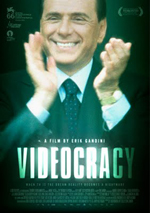The title is a successful synthesis of the intention of director Erik Gandini (born and educated in Italy but now living in Sweden). He aimed to explain Silvio Berlusconi’s grip on Italy’s democratic life through the combination of entertainment and politics.
Unfortunately, despite good intentions, the attempt is not successful. This documentary film remains superficial in addressing the issue, telling three parallel stories (two certainly true, the other one we cannot know) about characters who cannot represent the symbols of this ‘Berlusconi’ Italy.
The chosen method is not the right one: complex situations must be approached and analyzed for their complexity, not simplified! And God knows the current situation in Italy is complex!!!
Talking about an anonymous ‘poor’ worker (like Silvio) seeking fame or two shady showbiz characters (one of the ‘godfathers’ of the artistic scene Lele Mora and his former pupil, like Corona, now ‘reconverted’ in blackmailing public figures after stalking and photographing them to prevent the public from learning about their private life’s antics) doesn’t serve much purpose and certainly not the objective Erik Gandini set for himself.
We’ll leave it at that with this film that could have conveyed much more.
Yes, it is indeed true that Berlusconi’s Italy is taking a dangerously anti-democratic turn. While it may not have the characteristics of a dictatorship, it does present ‘fascist’ aspects that should alarm democratic consciences.
Yes, it is indeed true that Mr. Berlusconi’s model of commercial television has forged a hedonistic society without values where appearances are far more important than being.
Yes, the control over television information, through fraudulent laws and his current political position, allows Mr. Berlusconi to manage his message by modulating it as he pleases. Because in the world of information, the most important thing is what is said, how it is said, and especially what is not said. To do this, it involves placing compliant journalists in key positions and eliminating those who are not.
Yes, it is indeed true that in the political and governmental sphere, the management of the ‘res publica’ is conceived as if it were private property. With ministers not appointed for their competence but for their loyalty (and sometimes for personal relationships… like a former showgirl thrust into the Ministry for Equality!!! and with many other cases that deserve mention), with a Prime Minister who acts like a CEO believing there is one correct decision for the country: his.
Yes, it is indeed true that television is the most important source (82%) for forming public opinion, as shown very well by the surveys from the Osservatorio of Pavia, a study center analyzing the impact of information on the sociological behavior of Italians. Consequently, mastering it becomes fundamental, and some figures demonstrate this well: through the ‘sandwich’ method. 3 of the 6 national news programs are owned by Mr. Berlusconi, and the three others are from RAI, the national public television. They are controlled as follows: 1 by the Government, 1 by the parliamentary majority, and 1 by the opposition. Information is filtered according to the message to be conveyed. For example, insecurity, the second concern for Italians after unemployment, is given 82.3% coverage against 4.1% for the work crisis (survey of the week from February 28 to March 6). Thus, between servile editorials and complicit silences, electoral choices can be ‘formed.’
And ‘yes, it is indeed true’ much more could be written. All this to say what? To say, returning to Erik Gandini’s documentary film, that the opportunity was missed because the Italo-Swedish director could and should have stated clearly and firmly that the situation of democracy in Italy is serious and that this ‘disease’ has the complacency of a patient who does not feel at risk.
Because while being optimistic is good as the pleasing slogan of Mr. Berlusconi’s populist-commercial regime suggests, democracy (the union of the words ‘demos’ and ‘cratos’ that Greek philosophers bequeathed to us) demands a consciousness beyond that of televised ‘entertainment.’
It is a matter of returning to the essence of being and leaving appearances to the realm of bad memories. Operare sequitur esse (“First be, have values, then act”), as the sages of ancient times said. Will they (the Italians) do it, or will they continue to position themselves in this false modernity?


